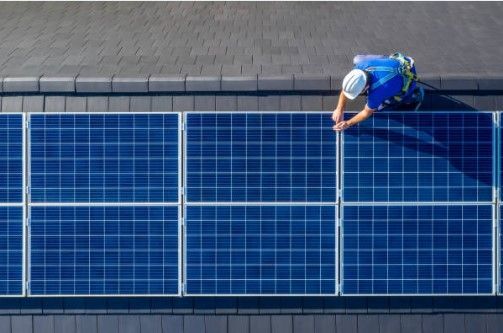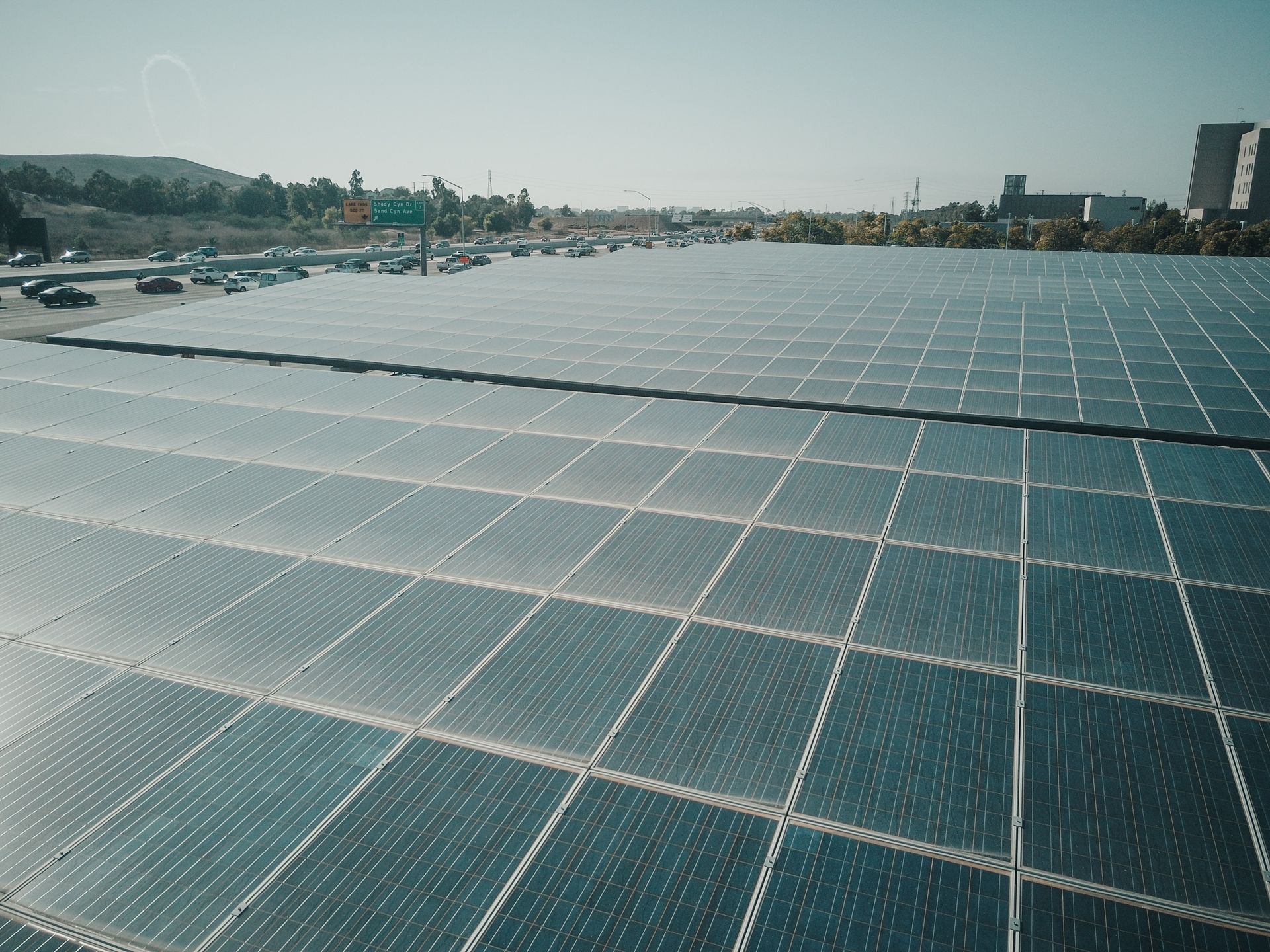Solar Energy Solutions for Commercial Businesses
Commercial businesses' adoption of solar energy solutions has gained significant momentum in recent years. Transitioning to solar power offers benefits that go beyond simple energy generation.
As the world seeks sustainable options, businesses benefit from reducing their carbon footprint and enhancing their operational efficiency and financial stability.
This blog will explore why considering solar energy solutions for your commercial business is a strategic move that can yield numerous benefits. The advantages of harnessing solar power are extensive and promising, from cost savings to improved brand image.

Cost Savings and Stability
Solar energy solutions present an avenue for substantial cost savings. Unlike conventional energy sources relying on costly fuels, solar power utilizes abundant sunlight, eliminating ongoing fuel expenses.
Solar panels convert sunlight into consistent electricity, ensuring stable energy costs. This predictability empowers businesses to forecast expenses accurately, free from unexpected price hikes. Opting for solar energy offers a dual benefit: substantial savings and peace of mind with fixed energy costs.
Cost of Solar Panels
Solar energy expert Aniket Bhor explains that the equipment is the main cost when you decide to go solar. The rule is simple: the higher the initial cost of the solar power system, the lower your overall savings will be.
Here's a straightforward example: If a system costs $300,000 and ends up saving you $1 million over its lifetime, your net savings would be $700,000. But, if that same system costs $400,000, your net savings would drop to $600,000.
The good news is that the costs of solar power equipment have been rapidly decreasing in a relatively short time. Solar panels and other components have become more than 80% cheaper in a decade.
Moreover, according to insights from Joe Kaptein's article, using similar assumptions as the 100 kW system (like a daytime grid electricity rate of 17c/kWh), the installation of a 200 kW commercial solar system can lead to approximately $38,400 in savings with an 80% self-consumption rate. If the anticipated increase in grid electricity prices occurs, these savings could escalate to about $58,000.
Enhanced Brand Image
When you use renewable energy like solar power, you strongly commit to eco-friendliness. This decision positively impacts your brand perception.
- Demonstration of Sustainability
Adopting solar energy showcases a commitment to sustainable practices, aligning your brand with eco-friendly values.
- Positive Environmental Impact
Businesses contribute to reducing carbon footprint. Thus, promoting cleaner energy sources, and preserving the environment.
- Attracting Environmentally-Conscious Consumers
This appeals to customers who prioritize businesses with sustainable initiatives, enhancing customer loyalty.
- Media and Public Relations Opportunities
Solar initiatives often gain media attention that allows you to highlight your eco-conscious efforts.
- Differentiation and Innovation
Stand out in the market by showcasing your innovative approach to energy consumption and environmental responsibility.
- Participation in Green Initiatives
Collaborate with local green initiatives and reinforce your role in community sustainability.
- Employee Morale and Attraction
Promote a positive work environment by aligning with employees' values and attracting talent that values sustainability.
Long-Term Investment and Energy Independence
Solar systems aren't just short-term solutions but long-term investments with impressive benefits. Solar panels have an average 25-30 years lifespan that generates energy well beyond their initial cost.
This extended operation ensures consistent energy savings and a substantial return on investment over time. Solar energy also grants businesses energy independence. Companies reduce dependence on external energy sources and grid fluctuations by generating electricity.
This autonomy shields businesses from energy price volatility and supply disruptions, fostering stability and predictability in operations.
Tax Incentives and Rebates
Governments worldwide recognize the importance of sustainable energy adoption and offer compelling incentives to businesses transitioning to solar power. These incentives include:
- Tax Credits
Governments provide tax credits to businesses investing in solar energy systems. These credits directly reduce tax liability that make solar installations more financially feasible.
- Rebates
Many regions offer cash rebates to businesses that install solar panels. These rebates provide a direct financial incentive to offset the initial costs.
- Grants
Government grants are available to support renewable energy adoption. Businesses can access these funds to cover a portion of their solar installation expenses.
- Accelerated Depreciation
Some countries allow businesses to accelerate the depreciation of solar assets, leading to increased tax deductions.
- Net Metering
Net metering programs enable businesses to sell excess solar energy back to the grid. This leads to reduced energy bills or even earning credits.
- Performance-Based Incentives
These incentives reward businesses based on the amount of renewable energy they generate, encouraging higher efficiency and output.
- Renewable Energy Certificates (RECs)
Businesses can earn RECs by producing clean energy, which can be sold or traded, providing an additional revenue stream.
- Energy Efficiency Loans
Some governments offer low-interest loans for businesses to finance solar installations, making investing in sustainable energy solutions easier.
- Local Initiatives
Local municipalities can provide additional incentives to encourage solar adoption, such as expedited permitting or fee reductions.
- Carbon Offsets
In some cases, businesses can earn carbon credits by reducing their carbon footprint through solar energy adoption, which can be traded or sold.
Increased Property Value
Solar panels significantly reduce energy costs for a commercial property, making it an attractive prospect for potential buyers or tenants seeking cost-effective operational expenses. Listed here are some of the reasons why installing solar can benefit your property value:
- Stable Investment
Solar panels are a long-term investment that provides ongoing energy savings and potential revenue from excess energy generation.
- Green Certification
Properties with solar installations often receive green certifications or eco-friendly labels, improving the property's marketability and attracting environmentally-conscious buyers.
- Marketing Advantage
Solar-equipped properties can be marketed as sustainable and environmentally friendly. This is specifically appealing to a growing segment of conscious consumers.
- Lower Operating Costs
Lower energy bills due to solar power can make the property more competitive in terms of overall operating costs, attracting businesses to prioritize cost-efficient operations.
- Future-Proofing
Solar installations showcase the property owner's commitment to sustainable practices. This makes a commercial property more resilient to future energy price fluctuations and regulations.
- Government Incentives
Some governments offer additional incentives or tax breaks for properties with solar installations, making them even more appealing to potential buyers.
- Long-Term Savings for Tenants
Properties with solar panels can offer tenants reduced energy costs. This enhances the property's appeal to businesses looking to minimize overhead expenses.
- Positive Public Perception
A solar-equipped property can contribute to a positive public perception of the property owner, demonstrating corporate responsibility and a commitment to environmental stewardship.
- Resale Value
Solar installations can improve a property's resale value as prospective buyers recognize the long-term benefits of reduced energy expenses.
Environmental Impact
Solar power offers a significant contribution to reducing greenhouse gas emissions and promoting a cleaner environment:
- Zero Emissions
Solar energy systems generate electricity without emitting harmful pollutants or greenhouse gases. A journalist, Autumn Spanne, explains in an article that, unlike fossil fuels, solar power production does not release carbon dioxide (CO2), sulphur dioxide (SO2), or nitrogen oxides (NOx) – key contributors to air pollution and climate change.
- Mitigated Carbon Footprint
Ovo Energy shares that by reducing reliance on fossil fuels, solar energy helps lower your business's carbon footprint. Every kilowatt-hour of solar-generated electricity offsets the need to burn coal, oil, or natural gas, decreasing CO2 emissions.
- Renewable Resource
Solar power relies on a renewable resource – sunlight – abundant and available everywhere. Harnessing this clean energy source minimizes the need for non-renewable fossil fuels, and thus, reducing emissions.
- Improved Air Quality
Solar power's lack of emissions leads to improved air quality, improving health outcomes for humans and ecosystems. Cleaner air reduces respiratory problems and other health issues associated with pollution.
- Climate Change Mitigation
Solar energy is vital in mitigating climate change by decreasing greenhouse gas emissions. The reduction in emissions helps slow down the warming of the planet and its adverse effects on weather patterns, sea levels, and ecosystems.
- Preservation of Natural Resources
Solar power reduces the demand for finite fossil fuels, preserving natural resources and ecosystems that would otherwise be exploited for energy production.
- Sustainable Future
Embracing solar power aligns with global efforts to transition to sustainable energy sources. Solar energy contributes to a cleaner, healthier, and more sustainable future for future generations by reducing pollution and promoting environmental responsibility.

How to Start Commercial Solar Installation
Starting a commercial solar installation involves several steps to ensure a successful and cost-effective transition to solar energy. Here's a comprehensive guide to help you get started:
- Energy Assessment: Evaluate your property's energy needs and solar potential.
- Budgeting: Estimate costs and explore financing options.
- Design: Collaborate on a customized solar system design.
- Permits: Obtain necessary approvals from authorities.
- Vendor Selection: Choose reliable suppliers and contractors.
- Installation: Install panels, inverters, and wiring.
- Grid Integration: Connect to the electrical grid.
- Testing: Verify system functionality and quality.
- Inspections: Schedule inspections for compliance.
- Monitoring: Set up performance monitoring.
- Maintenance: Plan for ongoing upkeep.
- Promotion: Highlight your sustainable commitment.
Power Your Business with Commercial Solar Company
Businesses may establish themselves as pioneers in sustainability by considering solar energy. The financial incentives and environmental advantages align seamlessly with long-term goals, fostering energy independence and paving the way for a greener future.
As the solar industry advances and technology becomes more accessible, the opportunity for commercial businesses to harness the sun's power has never been more promising. By exploring
solar energy solutions with us at Coquitlam Solar Energy, businesses can illuminate their path to a brighter, more sustainable future by combining economic growth and environmental responsibility.
CONTACT
Telephone: 604-337-1958
E-mail: info@coquitlamsolarenergy.ca
LOCATION
Coquitlam, BC V3B 0A4, Canada
Coquitlam Solar Energy | All Rights Reserved | 2023
